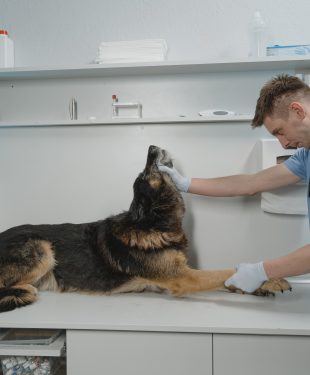Pets offer more than just their adorable looks, as they can significantly influence our mental health. Whether it’s a loyal dog greeting us at the door, a purring cat curling up on our lap, or even a chatty bird perched on our shoulders, pets bring joy, comfort, and a sense of purpose to our lives.
Our furry friends have the potential to decrease stress and anxiety, relieve symptoms of depression, and enhance our general state of wellness. In this blog post, we’ll explore the surprising ways pets can improve our mental health, backed by scientific research and real-life examples.
Companionship and Loneliness: How Pets Fill the Void
Loneliness can take a toll on our mental and physical health, particularly in the wake of the COVID-19 pandemic. But for many people, pets have been a source of comfort and companionship during these challenging times. Whether it’s a cat nuzzling against our leg or a dog wagging its tail with excitement, pets offer a sense of connection and belonging that can be hard to find elsewhere.
According to the studies published in the National Library of Medicine, a clear correlation between pet ownership and reduced social isolation was found. Furthermore, studies conducted during the COVID-19 pandemic have mostly demonstrated that owning a pet can help to alleviate feelings of loneliness. These findings confirm that pets can play an important role in promoting social connection and emotional support for their owners, particularly in times of stress and uncertainty.
Part of the reason pets are so effective at filling the void of loneliness is that they offer unconditional love and acceptance. They don’t judge us for our flaws or criticize us for our mistakes, and they simply love us for who we are. This can be especially meaningful for people who struggle with low self-esteem or social anxiety, as pets offer a safe and non-judgmental space to express themselves.
Of course, pets are not a substitute for human relationships, and it’s important to maintain connections with friends, family, and community. However, pets can be a valuable addition to our support system, providing comfort, companionship, and a sense of purpose. Pets may not be a panacea for loneliness, but they do offer unique and meaningful companionship that can enhance well-being and quality of life.
The Science Behind the Bond: How Pets Help Us Cope

Photo by on Pexels
Do you ever ponder why pets have such a strong impact on us? Studies reveal that interacting with pets can have various positive impacts on our physical and emotional health. These benefits include alleviating stress and anxiety, as well as improving our mood and cognitive abilities. One reason for this is the release of oxytocin, often called the “love hormone,” triggered by social bonding and touch. Several studies have indicated that positive interactions between dogs and humans, such as cuddling, can lead to an increase in oxytocin levels for both parties. Oxytocin is a hormone associated with positive emotional states.
In fact, a study found that dog owners experienced a significant increase in oxytocin levels, as much as 300%, after spending time with their dogs, including eye contact. The study suggested that eye contact was a crucial factor in the oxytocin surge. Additionally, pets offer a sense of purpose and routine to our lives, which can be especially important for people dealing with depression, anxiety, or other mental health conditions. Taking care of a pet requires us to engage in regular activities such as feeding, grooming, and exercise, which can help us stay focused and motivated.
Stress and Anxiety Reduction: How Pets Keep Us Calm
Pets are recognized for their ability to alleviate stress and anxiety, with one of their most well-known benefits being associated with this. Studies have demonstrated that the act of petting a dog can lead to a reduction in cortisol, a hormone linked to stress, while the social bond between humans and their dogs can cause an increase in oxytocin levels, which is also known as the feel-good hormone. The reason behind this effect is thought to be the companionship and social support that pets offer. Having a pet to talk to or hold can help us feel less alone and more connected to the world around us, even in times of stress or crisis.
In addition to their immediate calming effects, pets can also help to improve our long-term coping skills. By providing a sense of purpose and routine, pets can help us develop healthy habits and routines that promote physical and mental well-being. Studies in recent times have also investigated how pets can assist individuals in recovering from traumatic incidents. For example, a recent survey indicated that a remarkable 84% of post-traumatic stress disorder patients who were matched with a service dog experienced a notable decrease in symptoms, while 40% were able to decrease their medication.
The research suggests that pets, particularly service dogs, can play a valuable role in aiding individuals in their recovery from traumatic events, such as post-traumatic stress disorder. These findings indicate that pets can have a positive impact on mental health and can potentially reduce the need for medication.
From Depression to Happiness: How Pets Improve Our Mood

Photo by on Pexels
Pets have been known to improve our mood and overall mental health. Spending time with them can help reduce feelings of stress and anxiety, as well as lift our spirits. The unconditional love and affection that pets provide can create a sense of comfort and security, which can be especially beneficial for individuals dealing with depression or other mental health challenges.
Looking after a pet can instill a sense of duty and accountability, leading to a sense of accomplishment and contentment. This can be especially helpful for those who may feel a lack of purpose in other areas of their life. In addition to these benefits, simply having a pet around can provide a source of companionship and social interaction, which can help combat feelings of loneliness and isolation.
Nonetheless, having a pet entails a significant amount of obligation. As pet owners, it is incumbent upon you to ensure that your pets are in good health, content, and properly looked after. One crucial aspect of pet care is administering medications on time to keep pets healthy and prevent illnesses. One such medication is Famotidine, which is commonly prescribed to pets for gastrointestinal issues.
When given to dogs as directed by a veterinarian, Famotidine can help to alleviate symptoms such as vomiting, abdominal pain, and loss of appetite. It can also help to prevent future occurrences of stomach and intestinal ulcers.
Final Thoughts
It’s clear that pets have a remarkable ability to improve our mental health and well-being. From providing companionship and reducing feelings of loneliness and social isolation to helping us cope with stress and anxiety to improving our mood and reducing symptoms of depression, pets truly have a surprising impact on our mental health.
It’s important to remember that while pets can have a positive impact on our mental health, they also rely on us for their well-being. As pet owners, we are responsible for ensuring that our pets receive proper care and attention, including timely medications.
Read more fashion articles at ClichéMag.com
Images provided by Flickr, Unsplash, Pexels, Pixabay & Creative Commons




